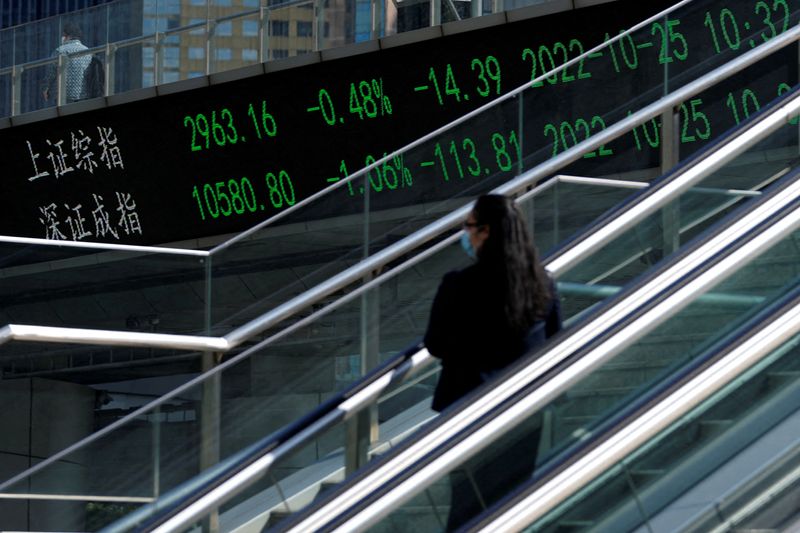By Winni Zhou and Summer Zhen
SHANGHAI/HONG KONG (Reuters) - China's retail investors have a case of deep pockets and heavy hands as they are skipping out on the sharp rally in stocks since COVID protocols were lifted, despite being flush with savings accumulated during the pandemic years.
The dismantling of three years of China's stringent zero-COVID policy has revived bets on a swift economic recovery and driven the stock market up 13% in three months. But retail investors are haunted by the regulatory purges, volatility and losses since 2021.
With 212 million retail investors, equal to Brazil's population, the conservatism of China's retail army has implications for the viability of the rally. Individual retail investor transactions accounted for about 60% of the total A-shares turnover in late 2022, China Securities Regulatory Commission Chairman Yi Huiman said in November.
Ma, a Shanghai native in his late 40s, is one of the squeamish.
"I have been asking around which stocks and when I should buy over the past month, in WeChat groups, from my veteran stock investor friends, and on social media," said Ma, who prefers to go by his family name.
"But I don't dare to enter the market just yet. The day-to-day volatility is worrying me as I don't have too much spare money to invest. Losses last year were so ugly."
The turnaround in the domestic A-shares market since November has been driven by a return of foreign capital inflows that are betting the world's second-largest economy will rebound.
But data shows barely any investor accounts being opened and the margin financing that retail investors typically use has plateaued. A household savings surge also suggests they have turned cautious.
The A-share market recorded 844,800 new investors in January, about 36% less than the increase a year earlier, according to the China Securities Depository and Clearing.
Without that retail bid, the A-share blue-chip CSI 300 Index is up just 17% since late October, while the Hong Kong-listed H-shares Hang Seng China Enterprises Index is up 44%.
Winnie Wu, China equity strategist at BofA Securities, says there is scope for further gains in stocks but if the investor caution persists, "in the bear case scenario, the market might be volatile".
Retail investors are waiting for clearer policy signals, said Lei Meng, China equities strategist at UBS Securities.
"Some investors are monitoring the strength and pace of the economic recovery this year while waiting for the policy signals from the upcoming Two Sessions," Meng said, referring to the annual parliamentary gathering in March when Beijing unveils economic targets.
BRIGHTER OUTLOOK SOUGHT
Whether "Generation Z" or retirees, investors said they are optimistic but only plan to invest more when the economic outlook brightens.
Li, an investor in his 40s, says "I don't have any plans to invest in the stock market for now. Money could go in, but may never come out."
Others will keep to their buying steady, like Sun, in her 30s, who said she will stick with her current automatic investment plan and not alter her investments in 2023.
Overly optimistic views on property and tech regulations being relaxed are also reasons for investors to be cautious, analysts warn.
"We expect the growth recovery to lose some momentum in the second half of this year," said Ting Lu, chief China economist at Nomura.
Highlighting the risk aversion, Chinese household deposits rose by a record 17.8 trillion yuan ($2.61 trillion) in 2022, far outpacing the 9.9 trillion yuan growth in 2021.
Zhou, a Shanghai-based investor in his 50s, is choosing certificates of deposit over stocks since they are less risky and less volatile. "We can't put all eggs in one basket," he said.
Eventually, however, the excess deposits are likely to be end up in the equity market once households become less risk-averse, said Wei He, China economist at Gavekal Dragonomics.
"The cash sitting in bank deposits is therefore more likely to flow back into financial assets than into extra consumption," he said.
($1 = 6.8201 Chinese yuan)
